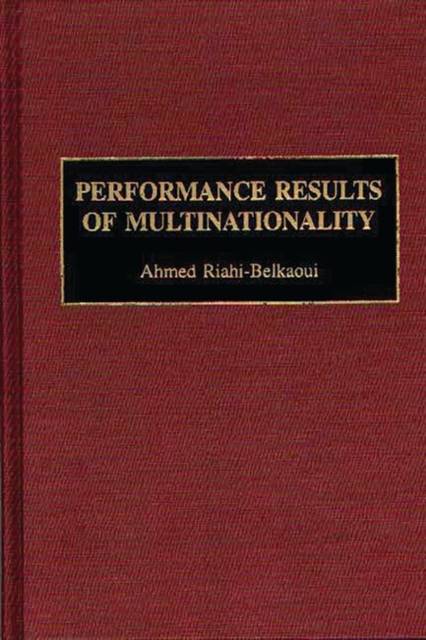
- Retrait gratuit dans votre magasin Club
- 7.000.000 titres dans notre catalogue
- Payer en toute sécurité
- Toujours un magasin près de chez vous
- Retrait gratuit dans votre magasin Club
- 7.000.0000 titres dans notre catalogue
- Payer en toute sécurité
- Toujours un magasin près de chez vous
Description
Multinationality, or the degree of internationalization, has favorable financial results and implications. Highly valued by the market as a hidden asset, multinationality is related to earnings management, systematic risk, capital structure, and growth opportunities as measured by the investment opportunity set. Riahi-Belkaoui examines the performance results of a multinational strategy and concludes that multinationality can be quantified and does play a significant role in keeping a firm healthy and growing. His book is a far-reaching examination of the data and a persuasive argument for why firms should make multinationality a critical part of their overall business strategy.
Riahi-Belkaoui presents research results supporting multinationality. He confirms that the market reacts more favorably the larger (smaller) cash flows are (accruals), and he shows that the preference of cash flows over accruals will increase under conditions of high multinationality and high reputation. He argues that the level of multinationality affects net income and net worth and thereby, political costs and risk. Analyzing the association between multinationality and systematic risk as measured by the market model beta, he finds that systematic risk is positively related to the level of multinationality after controlling for corporate reputation and other factors. He examines the role of multinationality and profitability as determinants of the investment opportunity set and considers whether a firm's investment opportunity is associated with corporate financing. Finally, he investigates whether disclosure policy, level of economic risk, and the nature of the alignment of financial and tax accounting explain differences in financial analysts' forecast error internationally. The book concludes with a model of the determinants of the investment opportunity set of multinational firms.Spécifications
Parties prenantes
- Auteur(s) :
- Editeur:
Contenu
- Nombre de pages :
- 200
- Langue:
- Anglais
Caractéristiques
- EAN:
- 9781567202779
- Date de parution :
- 30-05-99
- Format:
- Livre relié
- Format numérique:
- Genaaid
- Dimensions :
- 152 mm x 229 mm
- Poids :
- 467 g

Les avis
Nous publions uniquement les avis qui respectent les conditions requises. Consultez nos conditions pour les avis.






